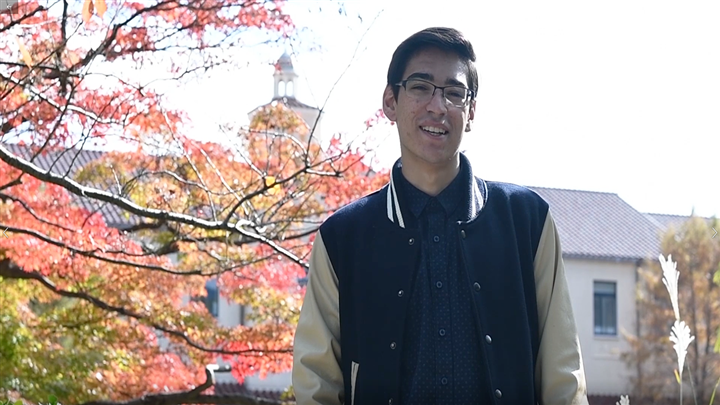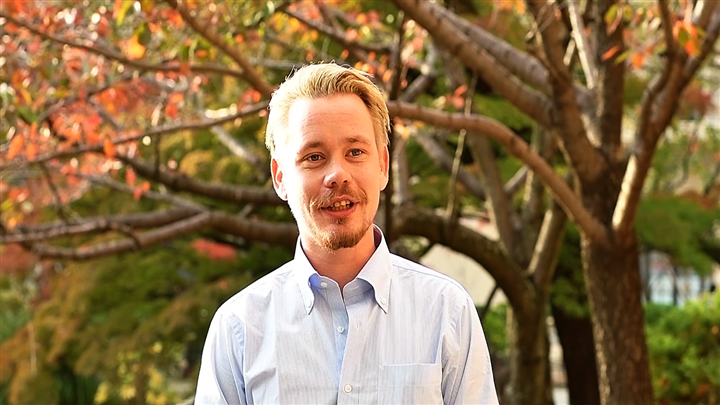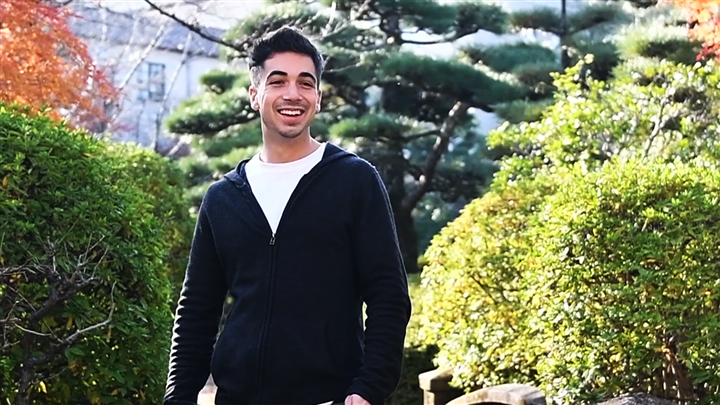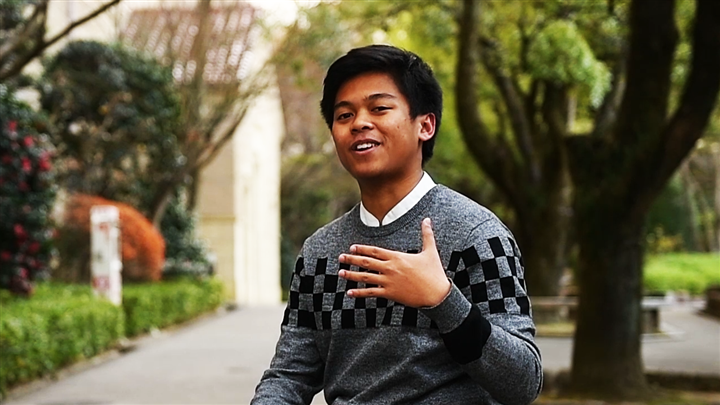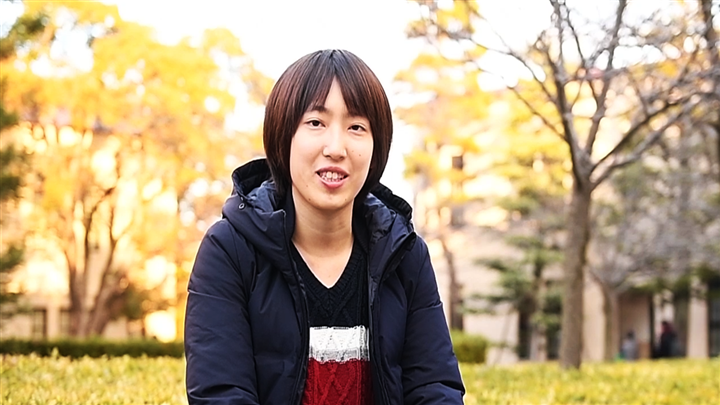- TOP
- Campus Life
- Studentsʼ Voices Top Page
- International Activities
- Marleen Bracht, Ruhr University Bochum

Students' Voices
Marleen Bracht, Ruhr University Bochum(Germany)
2019.11.27
Public Relations Office
Choosing KGU
Why did you decide to study here at KGU?
I was actually looking for an intensive language program to improve my Japanese language knowledge, because at my home university I study Japanese as my minor, and my grades are OK, but they could be better. I researched places on the Internet, and I also researched my university’s partner institutions, and I found this program, which sounded very interesting to me. I’d been to Japan two times before this visit, and I wanted to learn more about the culture. Also, the location of this university is quite good.
How much Japanese had you studied before you came?
I studied for two semesters, which is about eight months of Japanese. There are four levels at my university, so I still have to do two more. I think this intensive class gave me the chance to repeat some of the grammar I’d already done. I also work, so I don’t really have the time to continuously review what we do in class. This was an opportunity for me to just focus on my studies in Japanese.
Are you staying with a host family or are you staying in the dorms?
I’m staying in the dorms, together with the other people from my program. Here we have our own rooms, and the facilities are quite clean and well managed, and the housekeepers are very nice. I like it.

On KGU Student Life
Could you walk me through your average class day?
I start at 9. We have 90 minutes of Japanese class, break, and then another 90 minutes. Break at 12:10, and then we have another 90 minutes of class. Sometimes after lunch break we have culture classes where we get to learn about Japanese traditions, maybe about special festivals or something else they celebrate here. We also have meetups with Nihongo Partners, so Japanese students come to class and we talk to each other about different topics.
Do you meet your Partner almost every day?
Maybe we meet about twice a week. And we go to the Global Lounge to do flower arrangement, stuff like that.
Is there a particular culture class that stood out to you?
For example, the New Year festival in Japan, I read about it but I didn’t know the details. I think the teacher who told us, he told us the traditional ways of celebrating it. We asked our Nihongo Partners and they said it wasn’t celebrated like that anymore, but it was really interesting to learn about how people did it before. We also have a class about subcultures, about things like anime and manga and its history. The teacher was very nice and I think I was able to memorize a lot, which made it worthwhile.
Did you visit any culture sites?
We did lots of planned trips. Last weekend we went to Hiroshima, Himeji and Miyajima, to Itsukushima Shrine. We also went to Kyoto another weekend, and we had a homestay weekend as well. We were pretty fully booked.
Are there any particular places you spend a lot of time on campus?
The most time I spent on campus was actually in class (laughs). After having lunch we would sit out in the square in front of the gym, because during lunch there were often clubs doing activities there, and we would watch them. It was really cool actually.
How would you compare the students you’ve met here at KGU with the students at Ruhr University Bochum?
I think that with the Internet now, young people are quite similar to each other. We listen to the same music and we watch the same YouTube videos, but the campus life is completely different. I actually studied in Korea before as well, so I’m able to compare student life in Germany to the student life in Korea, too. I think I prefer the way that student life is in Asia, compared to the way it is in Germany. In Germany, you normally go to class and then after you finish, you go home. There is not really a campus life in the same way. We don’t have club activities and stuff, they are all separate from university. There is not a lot happening on campus, so when it’s vacation time, the campus is dead, there’s no one there. Here there are a lot of activities, and you enjoy staying on campus for longer. You sit on the green and meet up with your friends, and you see a lot of people, so you are able to meet a lot of people easily. Also, the clubs connect the students to each other more. It’s different, but I prefer it here in Japan and Korea. It feels more lively.
Future Aspirations and Advice for Prospective Students
As someone who’s about to finish the program at KGU, what would you say to people who are thinking about studying here? Do you have any advice?
Getting to do cultural exchange with Japanese students can be very interesting. One of our Nihongo Partners, I got very close with her, so we also meet up sometimes and go out for drinks and karaoke. We have fun. I think you should try to do that right from the start, so you can enjoy those five weeks together and learn a lot from each other. You are able to learn even more, like why Japanese people behave like that in certain situations, and the other way around. I also tell them about Germans and Europeans and why more Western people behave in certain ways. I think it’s very interesting to get into these kinds of exchanges. That’s one of the most important opportunities, especially between young people.
After you finish your program here, how will you take what’ve you learned here and apply it towards your future goals?
I’m finishing my bachelor degree now, and I’m actually planning to do my master program in Asia, so I will apply in Japan, Singapore and other places. I wanted to experience how student life is like in different countries. That’s why I took the chance to live here, and maybe I’ll apply for the master program here.
To finish up, what’s your favorite Japanese phrase or expression?
“Ganbatte kudasai” (do your best). I think it’s more motivating to be told to “ganbatte.” In German, we’d say something like “you can manage it,” which is not very positive. We point out more of the negative in German.

